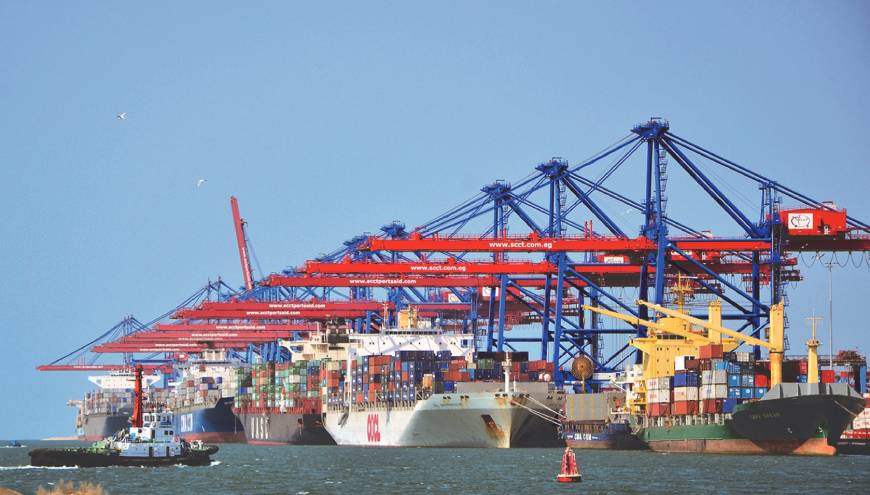Export to Egypt
Egypt is the third largest economy in the MENA region (Middle East and North Africa) and has the European Union as its main trading partner, both in terms of imports and exports. Although Egypt’s trade openness is relevant, the country maintains a certain degree of protectionism and, as of July 1, 2021, has implemented a new customs regulation that all companies exporting to this country must comply with.
Exporting to Egypt: things to consider
Egypt, a member of the World Trade Organization (WTO) since 1995, is the 37th largest economy in the world in terms of GDP. In the MENA region, made up of countries in the Middle East and North Africa, it is the third largest economy in the region, behind only Saudi Arabia and the United Arab Emirates.
With a population of over 100 million, Egypt’s GDP per capita stood at US$3,547 in 2020, according to the World Bank. This index ranks the country third on the African continent, after South Africa and Nigeria.
And, if we stick to the World Bank’s Doing Business 2020 index, Egypt ranks 114th in this ranking, made up of 190 countries.
The World Bank forecasts that, as in other economies in the area, the impact of covid-19 will cause the Egyptian economy to decline by 2.3% in the period 2020/2021, although this organization also points out that Egypt may gradually recover its development over the course of 2022 and 2023.
In terms of its competitiveness index (use of resources to improve the prosperity of the inhabitants), the World Economic Forum’s 2019 assessment ranked Egypt 93rd out of 141 countries.
Because of its geographical position, straddling the Mediterranean Sea and the Red Sea, Egypt has a high economic dependence on the income generated by the Suez Canal and the tourism sector – especially before the covid-19 pandemic. Even so, macroeconomic data show that this Arab Republic has been increasing its degree of trade openness over the last two decades.
This opening to commercial exchanges has been the result of various agreements that Egypt has signed with other countries and economic areas, especially the Association Agreement with the European Union which, after being signed in 2004, has helped the African country to become a center for accessing other markets in its immediate surroundings.
However, despite this and other trade agreements, which have led to a reduction in tariffs for many types of goods from abroad, Egypt maintains a certain degree of protectionism, which has increased with the appearance of covid-19, and imposes phytosanitary, quality or technical controls on imported products with the intention of protecting local production and preventing the entry of goods that do not comply with the quality and safety parameters required by the authorities.
Egypt’s trade partners
Egypt’s trade balance is clearly unbalanced as the volume of its imports (66,529 USM in 2019) exceeds that of exports (28,495 in 2019), according to data from the Central Bank of Egypt.
The main trading partners of Egypt’s imports – 2018 data – are: the European Union, with 26.7% of the total, followed by China (9%), Saudi Arabia (7.4%), Russia (6.9%), USA (5.4%) and the United States (5.1%).
What does Egypt import?
Within the European Union, Germany, Italy, France and Spain are the main exporters to Egypt, sending mainly manufactured and semi-manufactured products (medicines, spare parts and components for machinery and vehicles), raw materials (chemical and organic compounds) and agri-foodstuffs such as wheat and corn.
What does Egypt export?
As far as Egyptian exports are concerned, they go 35.7% to the EU, 10% to the United States, 7.7% to the United Arab Emirates, 3.9% to India and 3.7% to Saudi Arabia – 2018 data. These countries receive from Egypt petroleum products, gold, phosphates and fertilizers, textiles and clothing, polymers, chemical compounds, as well as vegetables and fruits.
Trade between Egypt and Spain
In the specific case of Spain, in 2020, Spanish exports to the African country reached 1,447 M€ and imports from Egypt reached 678 M€.
Spain exports to Egypt mainly: machinery and mechanical appliances, vehicles, tractors, electrical appliances and equipment and copper, while it imports: fuels and mineral oils, plastic materials and their manufactures, iron and steel and clothing.

New customs regulations for exports to Egypt
As of July 1, 2021, Egypt Customs has implemented a new regulation that is mandatory for all companies that want to export to Egypt. This measure is intended to simplify customs operations and prevent the entry of prohibited or unidentified goods into the country.
This new customs system, called Advance Cargo Information System (ACI), obliges the exporting company to declare and register the information of the goods in advance and before they are shipped to Egypt.
Documentation required for export to Egypt
In addition to the usual documents (commercial invoice, list of contents, export SAD, bill of lading, certificate of origin or health certificate, as required), Customs authorities require that the bill of lading be processed at least 48 hours prior to shipment from the country of export in order to monitor any risks and prevent the arrival of unsafe goods.
Sending this information in advance also allows Egypt Customs to reduce the time it takes to release the goods and reduce potential customs costs.
The ACI system covers Egyptian importing companies, foreign exporters and suppliers, and shipping and airline companies, although, in the first phase, only shipments of goods by sea are required to use the system.
In the ACI procedure, the Egyptian importer or consignee must be registered in the Nafeza portal, where it must also identify its supplier companies (foreign exporters), and is also required to have an authorized electronic signature.
Likewise, for any consignment of goods to be received, the Egyptian importer must request an ACID (advance cargo information declaration) number, which must be communicated to the exporter so that the latter can indicate it on all documentation (commercial and transport).
The importer must then submit the cargo information (with the ACID number) to Customs, but must do so before the goods have left the country of origin. Within 48 hours, the customs authorities will inform whether the import has been accepted or rejected.
For your part, the exporter has to upload the commercial and transport documents to the Cargo X blockchain platform, which allows information and documents to be created and exchanged securely and without intermediaries.
If the goods arrive at an Egyptian port without the ACID number on the documentation, the cargo can be returned to the origin, with the exporting company bearing any costs that may arise.







